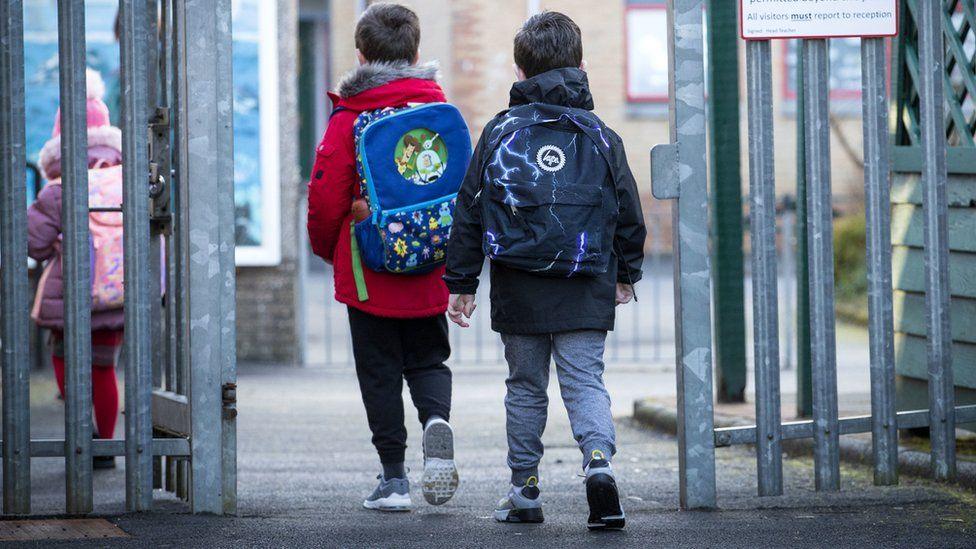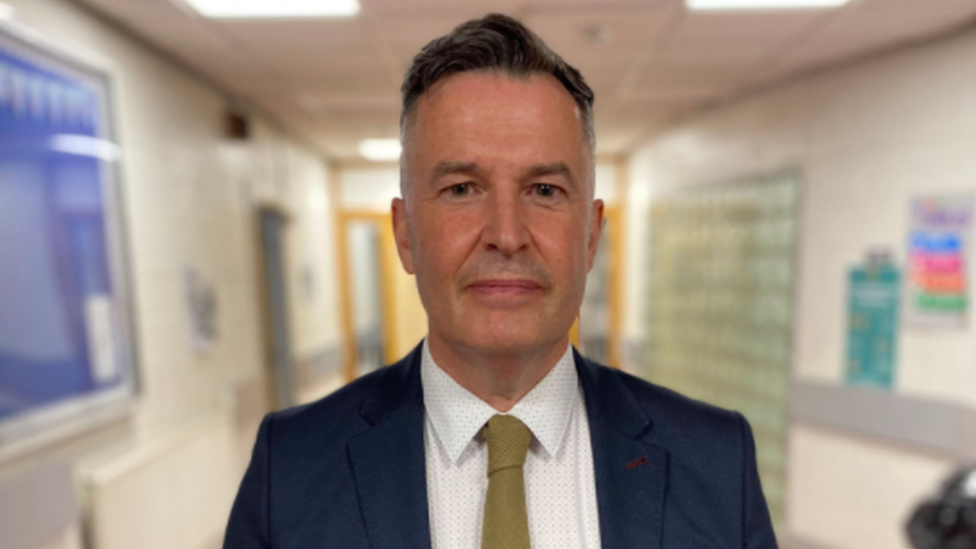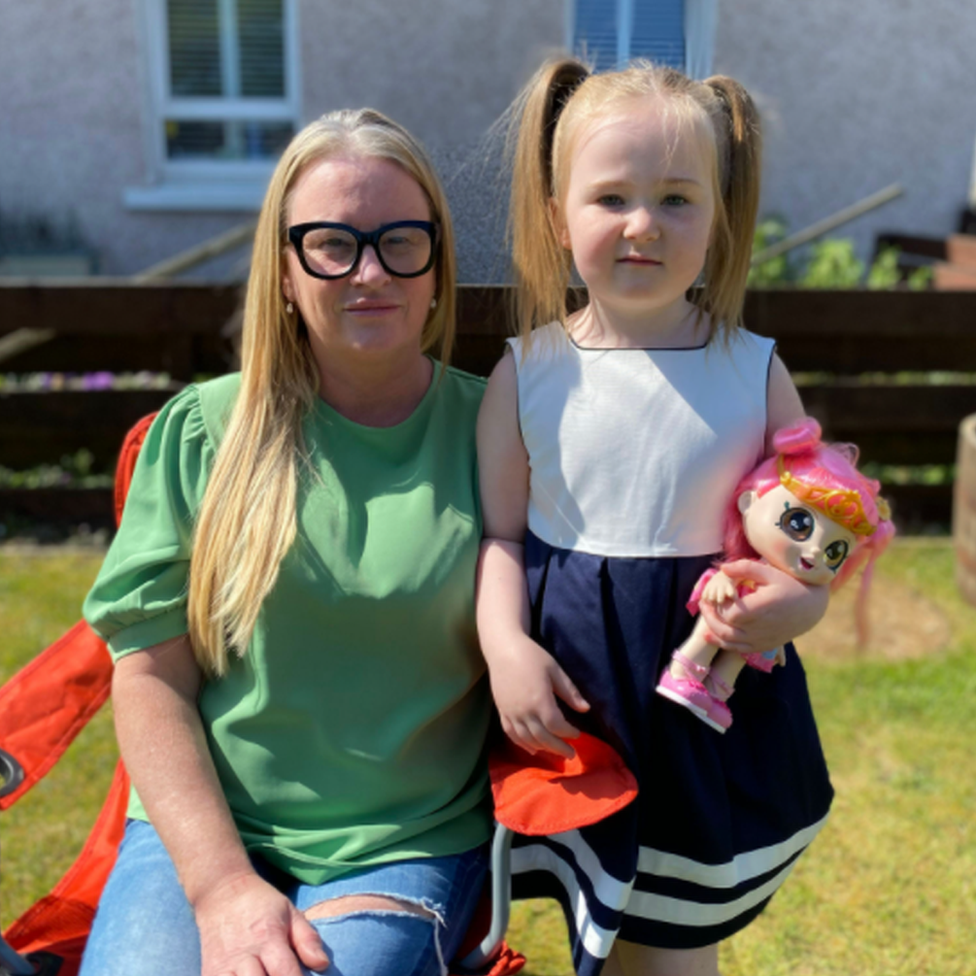Could schools hold the key to helping families claim benefits?
- Published

A programme aimed at tackling child poverty in a Glasgow school has helped families claim more than £400,000 in extra benefits in less than 18 months.
A financial inclusion officer was installed at Bellahouston Academy in December 2019 by Glasgow City Council and money advice service GEMAP.
It came after concerns were raised by a staff member about pupil poverty.
The pilot scheme, which was trialled at four Glasgow schools, is now set to roll out across all city secondaries.
To date, parents at Bellahouston Academy have made an additional 335 claims totalling £432,816.72 after being helped by the scheme.
Benefits claimed include Universal Credit, child benefit, child tax credits and clothing grants
Depute head teacher Murdo Macdonald drew attention to problems at the school.
He said some families were presented with backdated payments worth thousands.
He told BBC Scotland's The Nine: "I think sometimes when you see things in a classroom like children smelling because their clothes haven't been washed - those are the occasions where things can really hit you.
"You realise that some children are living lives that we have no cognisance of. They face challenges day to day that many of our teachers hadn't seen in other jobs across the country."

Depute head teacher Murdo Macdonald highlighted the issues at schools
On the work of the financial inclusion officer, Mr Macdonald said: "Sharon Graham has been helping our families over the last year-and-a-half to claim grants and entitlements they hadn't known about.
"The money is there. It is the people's money but the families just didn't know it was there to get.
"The NHS comes to the school yearly to vaccinate the children. I think the thing we have done here vaccinates them against poverty."
In total, the pilot scheme has helped families at four target schools involved claim £700,000.
Gena Howe, the council's child poverty manager, said: "We've even been surprised by how successful it has been.
"In this school alone, we have seen more than £400,000 in financial gains. But it's about more than that - it's about support for families, like employability support, digital referrals and fuel."
Figures released last month revealed 260,000 children, 26% in Scotland, were living in relative poverty at the start of 2020, despite targets to reduce that total to 10% by 2030.
During the Holyrood election campaign, all major parties have pledged to double the new Scottish Child Payment to £20-per-week per child. The benefit was introduced in February for children aged under six in families claiming benefits.
The benefit is expected to be rolled out for under-16s by late 2022.
In Glasgow, around 50,000 children are living in relative poverty.
'I've worked all my days...I just needed a bit of help'
Natalie Welsh was furloughed when the pandemic hit
Natalie Welsh is a former sheriff's officer and a part-time bar manager. She is a single mum looking after her daughter Willow, who is five.
Since the pandemic, Natalie has struggled financially after being furloughed and accruing large debts.
It meant the 44-year-old turned to food banks and help from friends to feed and clothe her daughter.
"I have a mortgage and bills and debt," she said
"I have a daughter to bring up as a single mum and I wasn't getting enough in for my outgoings.
"I wasn't sleeping and I wasn't eating."
Natalie said she sensed people in the neighbourhood were feeling sorry for her. "They were getting me to paint their dining rooms and their kitchens. They didn't even need painted but it was just so I could get an extra £10 or £15 here or there.
"I had to go on on Facebook to ask if anyone had any clothes for a five-year-old girl who has taken a big stretch. Everything she has on is hand-me-downs."
Natalie said she may have to consider selling the flat she has been paying a mortgage on for 20 years.
"The council couldn't put me on a housing list straight away," she said.
"They said I would have to wait until the house was sold, then I would have to declare myself homeless and take my daughter into a homeless unit.
"It's the last thing in the world I would want my daughter to be around or go into. Especially because I don't think I deserve to be in this (situation).
"I've worked all my days. I had two jobs until I had my daughter. I just wanted a bit of help from the government to get me through the pandemic and then I'd be back on my feet."
'There needs to be a higher rate of pay for people'

Suzanne McGlone and six-year-old daughter Tallulah
Suzanne McGlone works for local charity G53 for 30 hours per week, but 20 of those hours are voluntary.
She claims Universal Credit and cares for her six-year-old daughter Tallulah.
The 49-year-old rents an upstairs flat in Pollok for £550 per month. She said she has around £200 each month left over for food and entertainment.
Suzanne told The Nine that being paid for more hours would mean she would lose out on the housing element of her benefits claim.
She said: "There needs to be a higher rate of pay for people. They need to bring in affordable childcare as well - at one point I was paying £190 a week to put my child into a private nursery because I couldn't get a council nursery.
"That wasn't the council's fault. They could only offer me two hours here and two hours there. That's no use for me as I needed her in full-time."
She continued: "I am 49 years old and I have worked full-time since I was 14.
"I get barriers put up constantly. So if I work more hours, then they take the housing benefit off me.
"I don't know what to do for the best.
"I probably would need a £25,000 to £30,000 job, and I don't even know if it would be okay then.
"But as long as I am keeping my head above water, it is fine. It's important to show my daughter that you need to work to get where you want to get to in life."